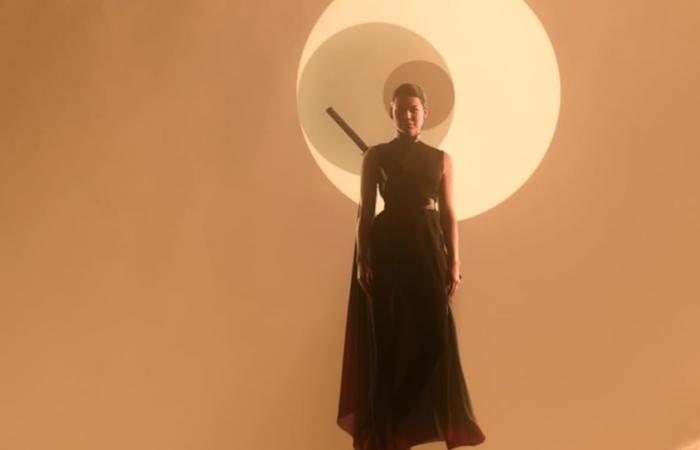“Themes are for eighth grade essays.” The screenwriter’s infamous statement David Benioff echoed through the heads of fans game of Thrones when the show’s final season, in 2019, was met with an almost universally bitter reception for its sloppy characterization swerves and paltry resolutions to disputes and fates that the show convinced us to invest time and affection in for years to come. Well, the successor work to Thrones in the careers of Benioff and his creative partner, DB Weissshows that the stupid belief demonstrated in those few words remains absolutely unshaken.
The 3-Body Problem twists the trilogy of books in Cixin Liudistinctly Chinese in its currents of historical reflection mirrored in intimate conflicts, to fit into what is most in vogue in business meetings pitch of streaming platforms: a “universal history”, whatever that actually means in 2024. The character Ye Wenjie (Zine Tseng in youth, Rosalind Chao in old age), who sees her father murdered by the Red Guard during the Chinese Cultural Revolution and ends up being recruited to work in a communist government laboratory, which secretly searches for extraterrestrial life. When she finally receives a message back from the aliens, however, the disillusioned Wenjie responds by calling them to come to Earth and conquer us.
Cut to 2024, when a group of Harvard-educated scientist friends, of different ancestries but based in London, find themselves dealing with the consequences of Wenjie’s choice, and what it could mean for the future of humanity. https://twitter.com/MrPepz/status/1771560528202133885 https://twitter.com/NetflixBrasil/status/1771220297296834723 https://twitter.com/dekawing/status/1771584732330865107 on social media since the series debuted on Netflixabout how advanced the concepts discussed by the characters are, and how deep the series dives into the technological and strategic possibilities that would be involved in defending the planet against an alien invasion – but the truth is that The 3-Body Problem It is very didactic, very averse to technical language, and very given to dynamic illustrations of its scientific problems. And that is, in fact, the best part of the entire series.
Especially at the heart of the season, and even more specifically in the episode “Destroyer of Worlds” (1×03), The 3-Body Problem thrives as a Telecurso 2000 with a million-dollar budget and unexpected good humor, which does a lot of good in unleashing the director’s imagination Andrew Stanton (Wall-E, Looking for Nemo) from the constraints of realism as you delve into the virtual reality world of the game created by aliens to recruit humans to their cause. According to Jack (John Bradley) and Jin (Jess Hong) travel through the game’s levels, encountering parodic versions of great scientists and infiltrating empires that invariably have a cartoonishly violent form of execution to inflict on their traitors, The 3-Body Problem not only does it “gameify” its science for a lay audience, it also shows itself to be acutely aware of the insufferable egos that guide its characters, just as they guided the great scientists before them.
It said Oscar Wilde about science professionals and other exact areas that “we can forgive a man for having done a useful thing, as long as he does not love it”. The 3-Body Problem is dealing (and, at its best, knows it is dealing) with a group of characters who flagrantly disregard this rule, and the emotional devastation that spreads through their lives because of it. Here is a group of friends who, without any exception, are not capable of loving anything or anyone (including each other) more than they love their own intellect, and the things they are capable of accomplishing with it. Hence Will (Alex Sharpe) is largely left to languish alone when he is diagnosed with cancer, as his friends are consumed with the mission of saving humanity 400 years in the future.
And the most frustrating thing is realizing that The 3-Body Problem comes so close, so often, to understanding and pointing out the pain that is created and intensified in this conflict between intimate and collective. The series constantly verbalizes the questioning of its characters’ priorities, but Benioff and Weiss (the episodes they write alone are the ones that do this the most) only use this questioning to arrive at a heroic justification. What the series never realizes is that the only genuine emotional discourse it finds in its eight episodes is that sneakily included in the aliens’ game – a sardonic embrace of the thinly disguised selfishness that guides the actions of those too terrified or inadequate to build relationships. true to those around them, they pretend to be dedicated to a “greater good” that has already largely escaped their hands.
Oscar Wilde also said, completing the same sentence from a few paragraphs above, that “the only excuse for having done a useless thing is to love it intensely, and all art is completely useless”. The 3-Body Problem, no matter how good it is at explaining and inventing its science, it won’t change the scientific direction of society – it’s just a Netflix series, and the transformative potential of the narrative doesn’t go much beyond a certain point of personal motivation and, with luck, mobilization collective. What it is, therefore, is art (and, as such, completely useless). And what she lacks, therefore, is love.
If the concept seems corny… well, bear with me. It is out of love for this futile enterprise of art that countless artists over the centuries have created characters who are deeply flawed and cruel, but also deeply capable of affection. It is out of love that actors take advantage of the breathing space given by these characters (a space that the cast is very capable of The 3-Body Problem they simply don’t have) to fill them with personal and outsider experiences that make sense to themselves and the public. It’s out of love that the stories we tell they say something – things that we agree to call, you see, themes.
And I’m sorry, Mr. Benioff, but you can’t tell a story without themes, because stories always say something. The work of counting them makes a discourse emerge, and this discourse is a consequence of the decisions that the teller makes in them – The 3-Body Problem, for example, is a victim of her own cynicism and her own inability to reflect on herself. What she ends up saying, in the end, is that humans are all vain creatures, careless about themselves and each other, full of ambitions of such megalomaniacal proportions that they don’t even fit on Earth itself, but blind to what ails them. on a much more fundamental, interpersonal, nuclear level (not in the sense of the bomb, but of the core of what it is to be human).
And it may even be that all of this is true. But, if it is The only truth about us, the fundamental truth about us, the true that overrides all other truths, why the hell are we still here? In the world of Benioff and Weiss, the arrival of the San-Ti could not come soon enough – not least because it would spare us the inevitable disappointment towards which their new creation is heading, as if predestined to repeat the mistakes of its predecessor, from the beginning. .
The 3-Body Problem
Ongoing (2024- )
The 3-Body Problem
Ongoing (2024- )
Created by: David Benioff, DB Weiss, Alexander Woo
Where to watch:






